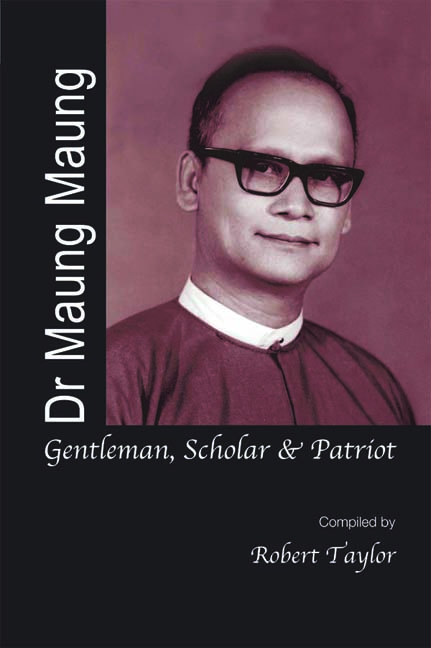Book contents
- Frontmatter
- Epigraph
- Contents
- Preface
- Acknowledgements
- Section I Dr Maung Maung: The Life of a Patriot
- Section II Dr Maung Maung's Approach to Life
- Section III Dr Maung Maung and Biography
- Section IV Dr Maung Maung and Travel
- Section V Dr Maung Maung and the Tatmadaw
- Section VI Dr Maung Maung and the Constitutions of Myanmar
- Section VII Dr Maung Maung and the Presidency
- Bibliography of Dr Maung Maung's Writings
- Index
- The Editor
Section VII - Dr Maung Maung and the Presidency
Published online by Cambridge University Press: 21 October 2015
- Frontmatter
- Epigraph
- Contents
- Preface
- Acknowledgements
- Section I Dr Maung Maung: The Life of a Patriot
- Section II Dr Maung Maung's Approach to Life
- Section III Dr Maung Maung and Biography
- Section IV Dr Maung Maung and Travel
- Section V Dr Maung Maung and the Tatmadaw
- Section VI Dr Maung Maung and the Constitutions of Myanmar
- Section VII Dr Maung Maung and the Presidency
- Bibliography of Dr Maung Maung's Writings
- Index
- The Editor
Summary
Dr Maung Maung's final public act was to assume, on 19 August 1988, the Chairmanship of the Burma Socialist Programme Party (BSPP) and thereby the Presidency of the Socialist Republic of the Union of Burma. His occupancy of the highest office in the land may be seen in retrospect as a quixotic attempt to defend a dead political order in the face of massive public protests at the old order's economic incompetence and geriatric administration under the all purpose slogan of a return to “democracy”. Certainly the nickname that some subsequently gave him, ta lat (one month) Maung Maung, conveys an image of the hopelessness of the task that was set for him. The growing clamour for him and his government to step down and hand over power to the self-appointed leaders of the demonstrators on the streets of Yangon, especially the recently returned daughter of national hero General Aung San, Daw Aung San Suu Kyi, former General Tin Oo, former Brigadier General Aung Gyi, and former Prime Minister U Nu, in the end made his efforts to restore peace and order, and then organize a constitutional transition, impossible. Their demand that the old order be abolished was eventually conceded but the ultimate agent of its end was not the leaders of the crowds in the streets but the tatmadaw, on 18 September 1988.
Dr Maung Maung, however, believed he was not defending the old order but preserving the fundamental constitutional point that political change, to be lasting and secure, must be guided by and ultimately maintained by the rule of law, especially a polity's fundamental law. This was the position he argued at the time as he attempted to reason with the crowd and subsequently in his defense of his Presidency. His speeches given to the Party, the Pyithu Huttaw (people's assembly) and the nation all conveyed this argument.
- Type
- Chapter
- Information
- Dr Maung MaungGentleman, Scholar, Patriot, pp. 523 - 566Publisher: ISEAS–Yusof Ishak InstitutePrint publication year: 2008



